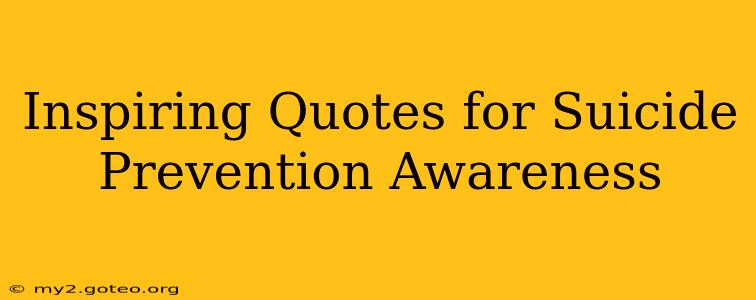Suicide prevention is a critical issue affecting individuals and communities worldwide. Raising awareness and offering support are essential steps in combating this devastating problem. This article compiles inspiring quotes that promote hope, resilience, and the importance of seeking help. These quotes serve as powerful reminders that help is available and that recovery is possible. We will also explore some frequently asked questions surrounding suicide prevention and mental health.
Why are Inspiring Quotes Important in Suicide Prevention?
Words hold immense power. Inspiring quotes can offer a lifeline to someone struggling with suicidal thoughts. They can provide a moment of solace, a spark of hope, or the courage to reach out for help. These messages of strength and resilience can remind individuals that they are not alone and that there is support available.
Powerful Quotes Offering Hope and Resilience
-
"The oak sleeps in the acorn; the bird waits in the egg; and in the highest vision of the soul a waking angel stirs. Dreams are the seedlings of realities." - James Allen: This quote speaks to the inherent potential within each individual, reminding us that even in the darkest moments, there is hope for growth and transformation.
-
"What lies behind you and what lies in front of you, pales in comparison to what lies inside of you." - Ralph Waldo Emerson: This powerful quote emphasizes the inner strength and resources each person possesses, encouraging self-reflection and the discovery of inner resilience.
-
"You don't have to control your thoughts, you just have to stop letting them control you." - Dan Millman: This quote speaks to the power of self-awareness and the ability to manage overwhelming emotions and thoughts. It highlights the importance of recognizing and challenging negative self-talk.
-
"The best and most beautiful things in the world cannot be seen or even touched - they must be felt with the heart." - Helen Keller: This quote reminds us of the importance of connection, empathy, and the beauty that can still be found even in the midst of pain.
What are some common misconceptions about suicide?
Misconception: People who talk about suicide won't actually attempt it.
Truth: Talking about suicide is often a significant warning sign. It's crucial to take all talk of suicide seriously and seek professional help.
How can I help someone who is suicidal?
Direct and Honest Approach: Express your concern directly and let the person know you care. Use phrases such as "I'm worried about you" or "I've noticed you've been struggling lately."
Active Listening: Create a safe space for them to share their feelings without judgment. Listen attentively, showing empathy and understanding. Avoid offering unsolicited advice.
Encourage Professional Help: Gently encourage the individual to seek professional help from a therapist, counselor, or doctor. Offer to help them find resources or accompany them to an appointment.
Know the Resources: Familiarize yourself with local suicide prevention hotlines, crisis text lines, and mental health organizations. Be prepared to offer immediate support and guidance.
What are some warning signs of suicide?
Behavioral Changes: Changes in sleep patterns, appetite, social withdrawal, increased risk-taking behaviors, neglect of personal hygiene, and giving away prized possessions.
Verbal Cues: Talking about death, suicide, or feeling hopeless, helpless, or worthless. Expressing feelings of being a burden to others.
Emotional Changes: Persistent sadness, anxiety, irritability, anger, or loss of interest in previously enjoyed activities.
Where can I find more information and resources about suicide prevention?
Numerous organizations dedicate themselves to suicide prevention and offer valuable resources, including hotlines, online support, and educational materials. Searching online for "suicide prevention resources [your location]" will yield relevant local information. Remember, you are not alone, and help is always available.
This article aims to provide information and support related to suicide prevention. It is not a substitute for professional help. If you or someone you know is experiencing suicidal thoughts, please seek immediate professional assistance. Your life is valuable, and help is available.

